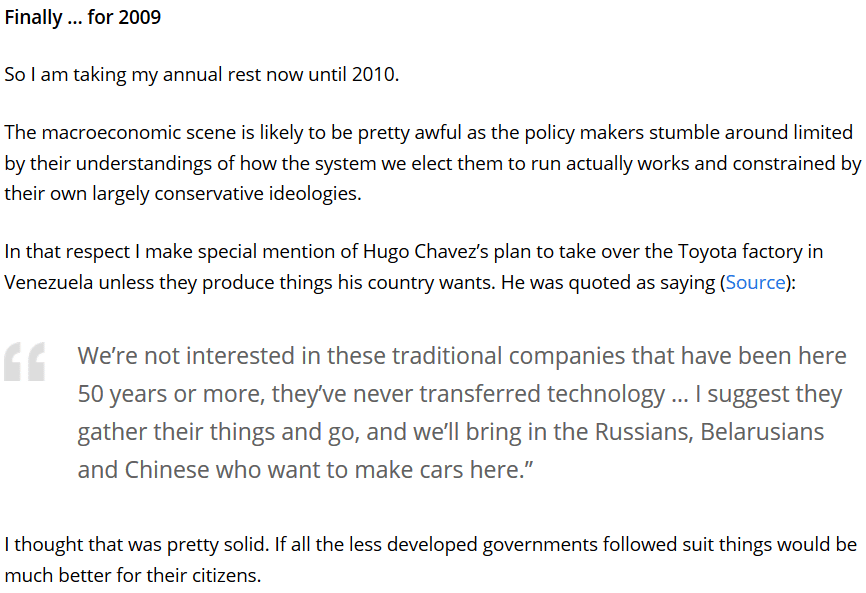MMTとチャベスの共通点
政府は「公正な社会」の実現のために、何はともあれ通貨を無制限に発行して必要な分野に支出するべし、というのが現代貨幣理論(MMT)の主張である。現行制度で放漫財政の抑制役になっている中央銀行と国債市場は政府の管理下に置かれる。副作用のインフレの恐れはあるが、財政支出だけではハイパーインフレーション(⇔財政破綻)にはならないので、何とかなるはずとのことである。
Q: Can we afford a #GreenNewDeal?
— Stephanie Kelton (@StephanieKelton) February 7, 2019
A: Yes. The federal government can afford to buy whatever is for sale in its own currency.
Q: Are you saying the government can just "print the money" to pay for new spending?
— Stephanie Kelton (@StephanieKelton) February 7, 2019
A: Is there any other way?
In my book, I make the case for “mission-oriented budgeting.” To fight the climate crisis, we need to replace fiscal targets with climate/social justice targets and make sure the budget fits the mission and not the other way around.
— Stephanie Kelton (@StephanieKelton) September 24, 2020
The fed gov't never needs to borrow its own currency from anyone. Selling bonds is a choice, and so is the interest (subsidy) it provides bondholders. Imp to realize Congress can always put more $ into health, edu, etc. even w/rising interest payments. Inflation is the constraint
— Stephanie Kelton (@StephanieKelton) September 23, 2020
Modern Monetary Theory proposes that the constraint on government spending shouldn’t be debt but inflation: How much new money can you pump into the economy before prices rise? https://t.co/iHxngaUAvJ
— The New Yorker (@NewYorker) August 20, 2019
Kelton is the foremost evangelist of a fringe economic movement called Modern Monetary Theory, which, in part, argues that the government should pay for programs requiring big spending, such as the Green New Deal, by simply printing more money.
Doesn’t M.M.T. then require accurate forecasting of inflation risk? Yes, and, Kelton conceded at the festival, the models aren’t perfect, “but we can do a pretty good job.” And, anyway, government spending, she believes, is responsible for just a small part of inflation.
政府は、公益のために通貨を支出する。
政府は、社会的支出――老後のため、医療のため、食糧配給券のため、貧困家庭支援のための支出――によって我々の自立を支援する。
貨幣制度は、我々が公正な社会を実現するように政府を機能させるために必要な資源へのアクセスを政府に与える一方で、個人の選択をも可能にする。
貨幣制度は、公共目的達成のために政府が利用する最も重要な仕組みの1つである。
財源を通貨発行から石油収入に置き換えれば、ベネズエラの故チャベス大統領の経済政策も似たものになる。ベネズエラ経済はハイパーインフレーションで滅茶苦茶になったが、MMTはまだ実施されていないのでいくらでも夢を語れる。
Opinion: Hugo Chavez showed that the socialist dream can turn into a nightmare https://t.co/v83hoHTSPb
— The Independent (@Independent) February 2, 2019
His economic policies involved a sweeping nationalisation, and he used sky-high oil prices in the 2000s to boost spending on health and education, food and housing. Initially the results were positive as income inequality was reduced, but then the wheels fell off the bus.
Attempts to spend his way out of a deficit and price controls saw inflation spiral.
Why Venezuela's oil money could keep undermining its economy and democracy https://t.co/BW38a3fWIM
— The Conversation U.S. (@ConversationUS) February 9, 2019
With that money, he built popular support by paying for dozens of safety net programs, such as the “Barrio Adentro” health initiative for the poor and the “Misión Robinson” literacy program, starting massive infrastructure projects, and continuing to subsidize the world’s cheapest gasoline.
財源がベネズエラでは油田、MMTでは需給ギャップ。
The reality is that there is almost always enough slack in the economy to allow for an expansion of federal spending (or tax cuts) without offsets. Think of it as our "fiscal space." We had enough fiscal space to do *some* of the things Dem presidential candidates were proposing.
— Stephanie Kelton (@StephanieKelton) March 23, 2020
Keltonがよく第二次世界大戦を例に出すのは、MMTでは戦時のような大規模で計画的な財政運営(mission-oriented budgeting)が常態化するためである。価格・賃金への政府の介入が強まるだけでなく、金利も政府の統制下に置かれる。旧ソ連の「五カ年計画」のような国家主導型経済への大転換である。
“[T]he US Fed is a creature of Congress, and Congress can seize control of interest rates any time it wants (and in WWII interest rate policy was essentially dictated by the treasury).” 3/5
— Stephanie Kelton (@StephanieKelton) February 24, 2021
下はBill Mitchellのブログの2009年12月31日の記事"The year ends badly and then …"の一部なのでよく見てもらいたい。MMTerの本音が表れている。


MMTとは単なる貨幣論ではなく、新左翼系の革命的イデオロギーなので、チャベスと方向性が一致する。
この記事が気に入ったらサポートをしてみませんか?
